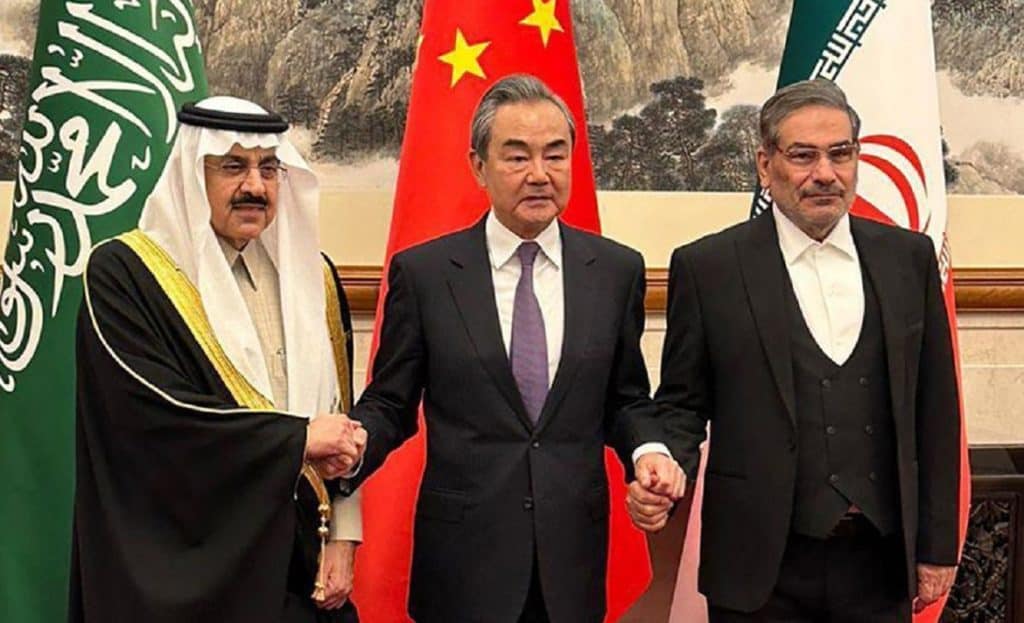World Geostrategic Insights interviews with Dr. Rabia Akhtar on the implications and opportunities for Pakistan and India resulting from a normalization of relations between Iran and Arabia, and whether a China factor is present in Pakistan’s economic crisis.

Dr. Rabia Akhtar is the Director of the Centre for Security, Strategy and Policy Research, University of Lahore. She is also the founding Director of the School of Integrated Social Sciences, University of Lahore and a nonresident Senior Fellow at the South Asia Center, Atlantic Council, Washington DC. She has written extensively on South Asian nuclear security and deterrence dynamics. She is the author of a book titled ‘The Blind Eye: U.S. Non-proliferation Policy Towards Pakistan from Ford to Clinton’ and she is also the Editor of Pakistan Politico, Pakistan’s first strategic and foreign affairs magazine. Dr. Akhtar was a member of Prime Minister Imran Khan’s Advisory Council on Foreign Affairs from 2018-2022.
Q1 – Pakistan welcomed the recent normalization of diplomatic relations between Saudi Arabia and Iran as an important diplomatic breakthrough. In praising China’s involvement in helping the two sides reach the agreement, Pakistani Foreign Ministry spokeswoman Mumtaz Zahra Baloch also recalled a role for Pakistan as a facilitator in conducting the dialogue between Saudi Arabia and Iran. What implications and opportunities does the normalization of Iran-Saudi ties represent for Pakistan, Iran’s neighbor, Saudi Arabia’s partner, and China’s key ally? How can China’s growing influence in the Middle East indirectly help Pakistan, both economically and strategically?
A1 – Tehran, Beijing, and Riyadh stand to gain considerably from this landmark deal in many ways. Tehran will get some breathing space in the wake of Western sanctions, Riyadh will get a chance to diversify its economy and foreign policy, and Beijing will get more diplomatic and economic cushion in the Middle East. And all three countries are important for Pakistan. Therefore, there will be implications of this momentous deal for Pakistan. For starters, Pakistan will not be asked to walk a tightrope between Saudi Arabia and Iran going forward. This, in and of itself, will open up more pathways for Islamabad. It could not only fully explore the potential of its bilateral relations with both these Muslim countries but also reach out constructively to important, burgeoning powers like Turkiye, Malaysia, and Qatar. All this is critical for Pakistan, especially at a time when it needs more economic partners. Moreover, China’s economic and diplomatic incursions in Saudi Arabia and Iran will engender many opportunities for Pakistan. I say this because Pakistan provides China a more direct and easier access to the Indian Ocean Region (IOR) and West Asia. Additionally, China’s strategic partnership with Iran and the growing synergy between its Belt and Road Initiative (BRI) and Saudi Arabia’s Vision 2030 mean that Pakistan’s bid to improve economic relations with both these Middle Eastern states will be supported. Resultantly, China could become a veritable anchor of greater economic integration between Pakistan, Iran, and Saudi Arabia. Most importantly, given Pakistan’s proximity to the Strait of Hormuz, dependence on oil imports, and the presence of a vibrant diaspora, stability in the Persian Gulf is absolutely critical for the country. Here, it must be noted that Pakistan’s previous mediatory efforts in the Middle East, not least in 2019, were guided by concerns relating to oil supplies and remittances. So, yes, any effort aimed at reducing the prospect of war and confrontation between the two bastions of the Muslim world is good news for Pakistan. And if any such initiative is driven by a desire to enhance economic connectivity and integration, Pakistan must fully support it. Luckily, this is what the country is committed to doing.
Q2 – India’s response to the rapprochement between Iran and Saudi Arabia has been rather muted, and some experts have called this silence disconcerting. In your view, what does this agreement mean for India? As part of the I2U2 group of four nations, consisting of India, Israel, the United Arab Emirates and the United States, does India remain isolated from the new convergence between Saudi Arabia, Iran and China? Or could India also benefit from the agreement? In broad terms, what might the China-Iran deal and Beijing’s growing influence in the Middle East mean for the geopolitical balance in South Asia?
A2 – India is a dynamic economy and a country that covets great power status. Rationally speaking, a peaceful Middle East, even if crafted by China, is great news for India. The country needs new markets; it wants better digital connectivity, not to mention the fact that it needs new areas to leverage its soft power. All this, I must stress, will become easier to achieve if there is peace in the Middle East. For example, a more integrated Iran will help India meet its energy demands and get access to the Central Asian Republics (CARs). However, India’s opposition to the BRI, not least its flagship project in the China-Pakistan Economic Corridor (CPEC), indicates that it will continue to see this as a Mission Creep from China. It needs to embrace new economic and political realities rather than sabotage it. Its disregard for China’s connectivity juggernaut can be evidenced by its sub conventional actions against CPEC. Therefore, only if India stops seeing regional connectivity initiatives as zero-sum games, it could gain a lot from a thaw in the Middle East. Continued recalcitrance may not cut it going forward. It would be interesting to see how India engages with Iran and Saudi Arabia now that both countries are amenable to working in concert with China, be it under the Shanghai Cooperation Organization(SCO) or Brazil, Russia, China, India, and South Africa (BRICS).
Q3 – China has been Pakistan’s main economic partner, providing multibillion-dollar inflows through CPEC, the flagship project of the Belt and Road Initiative (BRI). However, CPEC’s progress has now slowed. Currently, as Pakistan’s economic crisis deepens, critics, especially in Washington and other Western capitals, blame Chinese debt in Pakistan. Which is your opinion? There is really a negative China factor in Pakistan’s economic crisis?
A3 – I don’t think that China is to be blamed for Pakistan’s economic crisis. It is very much self-created. Chinese debt, I must stress, is just a fraction of Pakistan’s ever-increasing external bill. Pakistan has landed itself in deep trouble only because of its failure to enact structural reforms in its economy. Pegging of the exchange rate, little to no focus on exports, distortions in the tax regime, and an ever-consolidating elite capture have stunted the country’s economic growth. Political instability continues unabated since April 2022, something which has hurt the country’s exports, industrial output, and the flow of remittances badly. Obviously, CPEC, which was progressing despite the advent of COVID-19, is beset by delays. Further, owing to the structure of the country’s political economy, Pakistan is finding it difficult to convince the International Monetary Fund (IMF) and other donors to bail it out. Therefore, it is time for Pakistani policymakers to introspect and get the reforms’ ball rolling before it is too late. Once Pakistan carries out a set of basic reforms, it can indeed act as a quintessential melting pot for regional and global economic interests. For now, it needs to change tack quickly.
Dr. Rabia Akhtar – Director Center for Security, Strategy and Policy Research, University of Lahore, Pakistan.







